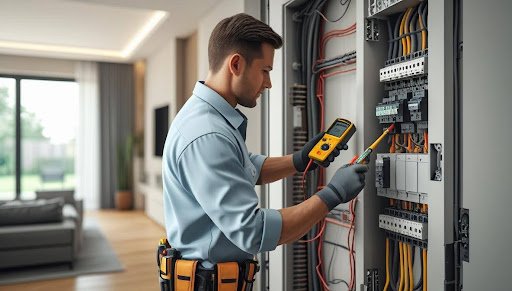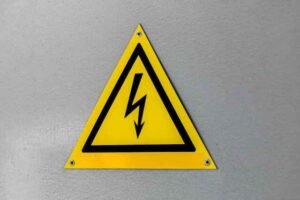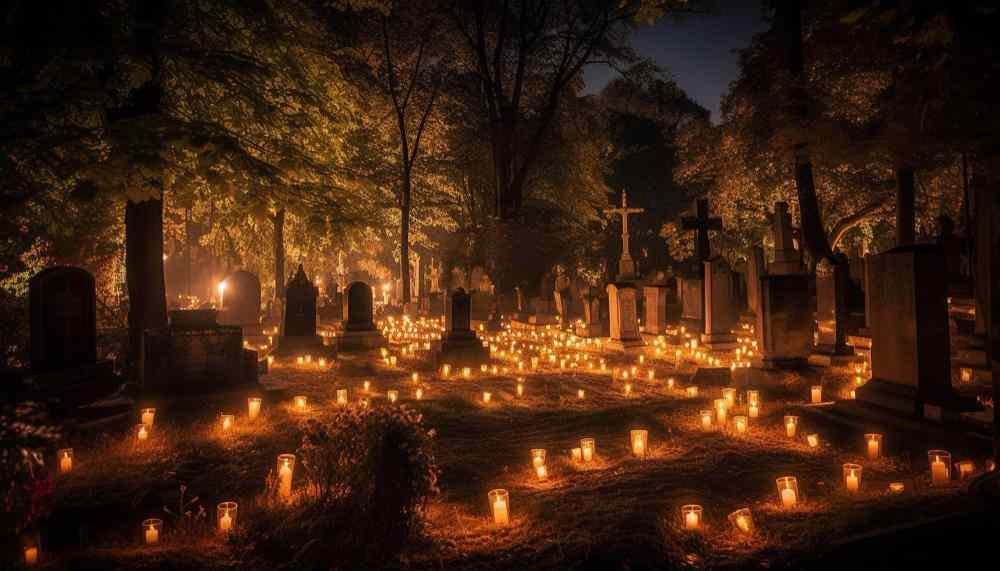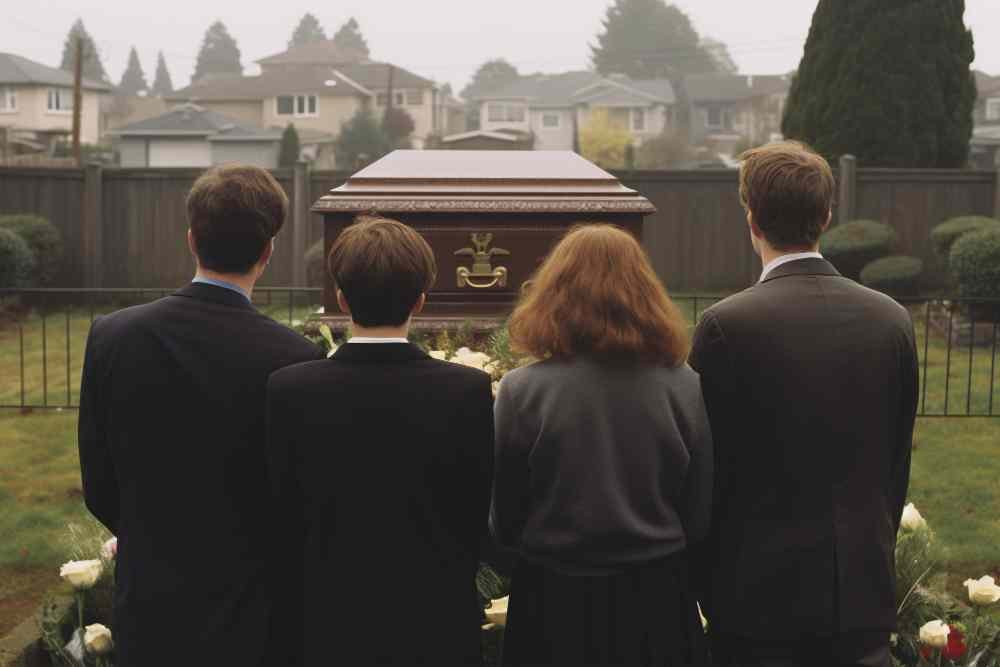Building codes are rules that keep homes safe. Electrical codes are especially important because they prevent accidents and fires. These rules aren’t just paperwork – they’re based on years of research to make sure electrical systems in homes are safe. Let’s learn why following these codes is so important for homeowners and the people who work on houses.
Key Points
- Building codes ensure electrical safety in homes
- Licensed electricians are qualified to meet code requirements
- Codes vary between regions but share common safety goals
- Non-compliance can lead to hazards and legal issues
- Regular inspections help maintain code compliance
Understanding Electrical Building Codes
What Are Electrical Codes?
Electrical codes are rules that say how electrical systems in buildings should be set up. They’re made to keep people and buildings safe from electrical dangers. These codes cover things like how wires should be installed, what kind of equipment to use, and safety rules to follow. The codes change over time as we learn new things about safety and as technology gets better.
Who Sets the Standards?
Different groups make electrical standards depending on where you live. In the United States, the main standard is called the National Electrical Code (NEC). It’s updated every three years to include new safety ideas. In Europe, they have their own rules set by the European Union. There’s also a group called the International Electrotechnical Commission (IEC) that helps make standards for the whole world. Local governments can add their own rules too, to fit what their area needs.
Common Residential Requirements
For homes, electrical codes usually cover these things:
- How to install wires and what materials to use
- Grounding requirements to prevent shocks
- Circuit breakers and fuses to stop overloading
- Where to put outlets and switches
- Rules for lighting, including energy-saving ideas
- Special protection in wet areas like bathrooms
- Protection against electrical fires
- Rules for special things like electric car chargers or solar panels
The Role of a Licensed Electrician
Qualifications and Certifications
Licensed electricians go through a lot of training to make sure they know how to do electrical work safely. They usually:
- Complete a 4-5 year apprenticeship where they learn on the job and in classrooms
- Work for about 8,000 hours under supervision
- Pass tests on electrical theory and how to apply the codes
- Get a license from their state or local government
- Keep learning to stay up-to-date with new rules
Legal Responsibilities
Hiring a licensed electrician is important to make sure your home’s electrical work is safe and follows the law. These electricians have to:
- Follow all the electrical codes
- Get the right permits for the work they do
- Make sure their work passes inspections
- Keep records of what they did and what materials they used
- Tell homeowners about how to take care of the electrical work
- Stay informed about new codes and best practices
Risk of Using Unlicensed Contractors
Using someone who isn’t licensed to do electrical work can be dangerous. Here’s why:
- The work might not be safe or follow the rules
- It could cause fires or shocks
- The homeowner could get in trouble if something goes wrong
- Insurance might not cover problems from unlicensed work
- It could cause issues when trying to sell the house
- The work might need to be redone, costing more money
Compliance During Home Renovations
Permits and Inspections
When you’re fixing up your home, you usually need permits and inspections for electrical work. This makes sure everything is safe. Remember:
- You need to get permits before starting work
- Inspectors will check the work at different stages
- You need final approval before using the new electrical stuff
- Not getting permits can lead to fines or having to redo the work
- Big projects might need several inspections
Renovation Projects That Trigger Code Requirements
Some home projects are more likely to need electrical upgrades:
- Kitchen remodels, especially when adding new appliances
- Bathroom renovations
- Adding new rooms to the house
- Finishing a basement
- Turning a garage into living space
- Making an attic into a room
- Installing big things like hot tubs or electric car chargers
Electrical Work That Must Be Professionally Handled
While you can do some small electrical jobs yourself, many tasks need a professional:
- Upgrading the electrical panel
- Rewiring large parts of the house
- Adding new circuits for big appliances
- Outdoor electrical work
- Anything involving high voltage
- Installing whole-house surge protectors
- Complex lighting systems
- Setting up generators
Regional Differences in Code Enforcement
Comparing UK, EU, and US Code Compliance
Different places have different rules for electrical safety:
| Aspect | UK | EU | US |
| Primary Regulatory Body | IET | CENELEC | NEC |
| Code Update Frequency | Every 3 years | Ongoing process | Every 3 years |
| Mandatory Certification for Electricians | Yes | Varies by country | Varies by state |
| DIY Electrical Work Allowed | Limited | Varies by country | Varies by state |
| Inspection Requirements | Strict | Varies by country | Strict, but varies |
Local Authority Involvement
Local governments play a big part in making sure electrical work is safe:
- They decide which codes to use in their area
- They give out permits and check the work
- They can fine people who don’t follow the rules
- They teach people about electrical safety
- They work with power companies to solve problems
- They keep records of inspections and rule-breaking
Consequences of Non-Compliance
Legal and Financial Penalties
Not following electrical codes can get you in trouble:
- You might have to pay fines
- You could be responsible if someone gets hurt
- Fixing non-compliant work can be expensive
- In serious cases, you might face criminal charges
- It can be hard to sell your house
- You might not be allowed to use the building
Home Insurance Complications
Not following codes can cause problems with your home insurance:
- The insurance might not pay for electrical fires
- Your insurance costs might go up
- The insurance company might cancel your policy
- It can be hard to get new insurance
- You might have to pay for damages yourself
Health and Safety Hazards
The biggest risk of not following codes is danger to people:
- Higher chance of electrical fires
- Risk of getting shocked or electrocuted
- Possible damage to your house
- Your appliances might break
- You could breathe in toxic smoke if something burns
- Long-term health problems from bad wiring
How Homeowners Can Ensure Compliance
Hiring Verified Professionals
To make sure your electrical work follows the rules:
- Check if the electrician has a license and insurance
- Ask about their past work and if anyone has complained
- Make sure they get the right permits
- Ask for written details of the work they do
- Get a warranty for the work
- Make sure they know the local rules
Reviewing Building Plans with Experts
For big projects, it’s important to:
- Talk to licensed electricians when planning
- Check that plans follow all the rules
- Think about future electrical needs
- Ask about energy-saving options
- Get approval from local building authorities
- Consider hiring an independent inspector for big jobs
Keeping Records of Electrical Work
Keeping good records of electrical work is important for:
- Showing that your house follows the rules
- Making future repairs or upgrades easier
- Helping with insurance claims
- Making sure warranties are valid
- Knowing when to do maintenance
- Fixing problems by looking at past work
Conclusion
Following electrical building codes is really important for keeping your home safe. Working with licensed electricians and knowing about the rules helps protect your home and family. It’s better to do things right than to take shortcuts or use people who aren’t qualified. As electrical systems change with new technology, it’s important to stay up-to-date and use certified professionals. Regular checks, good maintenance, and updating your electrical system when needed will help keep your home safe and following all the rules for years to come.
For more, visit our website Home Threads







